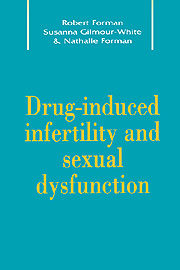3 - Psychotropic and central nervous system drugs
Published online by Cambridge University Press: 30 March 2010
Summary
Effect of psychiatric disease on sexual function
The relationship between psychotropic medication and sexual dysfunction is complicated by the fact that abnormalities of sexual function are common symptoms of underlying psychiatric illness. For example, impotence in untreated psychiatric patients is estimated to be as high as 70% depending on the diagnosis. In a controlled study of schizophrenic males versus healthy men, significant differences were found in most aspects of human sexuality between the groups. The failure of many studies and reports to include information regarding baseline sexual function makes interpretation of published data difficult. In some situations, the untreated patient cannot be relied upon to give an accurate sexual history even if questioned directly.
Despite these reservations, many data have accumulated, mainly from case reports but also from a handful of controlled trials, to suggest that some psychotropic medication does have a negative effect on sexual function. This may be a significant cause of non-compliance leading to psychiatric relapse.
Antipsychotics (neuroleptics)
Antipsychotic medication is often associated with sexual dysfunction, occurring in over 50% of patients in some studies (Buffum, 1982). The most common form of sexual dysfunction, seen both in male and female patients treated with neuroleptics, is decreased libido. Erectile and ejaculatory dysfunction are also common. Disturbances of orgasmic function occur less commonly. Neuroleptics have been reported to produce abnormalities in sperm morphology compared with the sperm of non-medicated schizophrenics (Nestoros, Lehmann & Ban, 1981).
Priapism has also been described in patients treated with antipsychotic medication. The mechanisms of drug-induced dysfunction with neuroleptics are complicated and may be mediated by hormonal and by both central and peripheral neurological mechanisms.
- Type
- Chapter
- Information
- Drug-Induced Infertility and Sexual Dysfunction , pp. 29 - 51Publisher: Cambridge University PressPrint publication year: 1996



